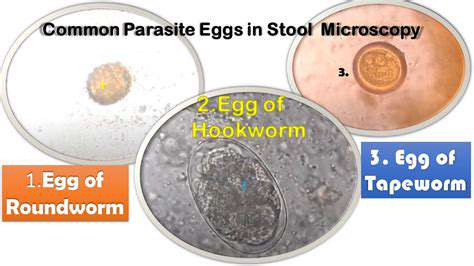The most common parasites affecting dogs and how to prevent them
Fleas and ticks are common external parasites that can cause significant discomfort and health problems for dogs. Fleas, notorious for their irritating bites, can lead to allergic dermatitis, a severe skin condition, in some dogs. Their constant feeding also transmits diseases like tapeworms.
Ticks, on the other hand, can transmit diseases like Lyme disease and Rocky Mountain spotted fever. Prompt removal of ticks is vital to prevent the spread of these potentially serious illnesses. Regular preventative measures, such as topical medications and flea/tick collars, are essential for controlling these external parasites.
Internal Parasites: Roundworms and Hookworms
Roundworms and hookworms are common internal parasites that can infest a dog's intestines. Roundworms, often acquired through contaminated soil or food, can cause significant damage to the intestinal tract. Symptoms can range from mild digestive upset to severe malnutrition and organ damage, especially in puppies.
Hookworms, similarly transmitted, attach to the intestinal lining, causing blood loss and anemia. This blood loss can be particularly detrimental to young puppies, leading to weakness, lethargy, and stunted growth. Regular deworming is a critical aspect of preventative care for these internal parasites.
Heartworms: A Serious Threat
Heartworms are a particularly insidious internal parasite, residing in the heart and lungs of infected dogs. These parasites are transmitted by infected mosquitoes and can cause severe and potentially fatal damage to the cardiovascular system. Early detection and treatment are crucial to prevent long-term complications and ensure the dog's health.
Regular preventative medications are essential to protect dogs from heartworm infection, especially in areas with a high mosquito population. Prompt veterinary attention is critical if heartworm infection is suspected.
Tapeworms: Transmission and Symptoms
Tapeworms are another common internal parasite that can affect dogs. These parasites can be transmitted through the consumption of infected fleas or rodents. They often manifest as visible segments in the dog's feces, providing a clear indication of infection. Symptoms can range from mild digestive upset to more severe conditions, depending on the extent of the infestation.
Regular fecal examinations can aid in the early detection of tapeworm infestations and allow for timely treatment.
Protozoa and Other Parasites
Beyond the more common parasites, dogs can also be affected by protozoa like giardia and coccidia. These microscopic organisms can cause gastrointestinal issues, ranging from mild diarrhea to severe dehydration and malnutrition. Proper hygiene and parasite prevention protocols can significantly reduce the risk of infection from these various parasites.
Understanding the specific types of protozoa and other parasites, along with their transmission methods, is essential for developing effective preventative strategies and providing appropriate veterinary care to infected dogs.
Internal Parasites: A Deep Dive into Roundworms, Hookworms, and Tapeworms

Understanding Internal Parasites
Internal parasites, often microscopic or macroscopic organisms, are a significant concern for the health of animals, including humans. These parasites reside within the host's body, often utilizing the host's resources for survival and reproduction. Identifying these parasites early and implementing appropriate treatment strategies is crucial for preventing severe health complications. This is vital for the well-being of the host and for maintaining a healthy ecosystem.
The diverse range of internal parasites includes various types of worms, protozoa, and flukes, each with its own life cycle and methods of infection. Understanding these complexities is essential for effective preventative measures and treatment protocols.
Types of Internal Parasites
Internal parasites encompass a wide array of organisms, including nematodes (roundworms), cestodes (tapeworms), trematodes (flukes), and protozoa. Each type exhibits unique characteristics in terms of their structure, life cycle, and the diseases they cause. Nematodes, for example, are characterized by their cylindrical shape and are often found in the digestive tract. Understanding the specific types of parasites present in a particular environment is vital for targeted control measures.
Furthermore, different species of parasites can cause a range of symptoms, from mild discomfort to severe illness. Understanding the specific parasite present is essential for selecting the correct treatment, and in some cases, preventative measures.
Infection Mechanisms
Internal parasites can enter the host through various pathways, including ingestion of contaminated food or water, contact with infected animals, or through vectors like mosquitoes or ticks. The specific infection mechanism can vary depending on the type of parasite. Understanding these transmission routes is crucial for implementing preventive measures and controlling the spread of infection.
Diagnosis and Treatment
Diagnosis of internal parasites often involves examining fecal samples for the presence of eggs or larvae. Depending on the specific parasite, other diagnostic tools, such as blood tests or imaging techniques, may also be necessary. Effective treatment strategies are crucial to eliminating the parasites and preventing complications. These strategies often involve deworming medications tailored to the specific parasite species.
Treatment regimens must be carefully followed to ensure the complete eradication of the parasites. Failure to adhere to the prescribed course of treatment can lead to parasite resistance and the recurrence of infection.
Prevention Strategies
Preventing internal parasite infections is a crucial aspect of maintaining animal health. Proper hygiene practices, such as regular cleaning of animal enclosures and the use of disinfected water sources, are vital for reducing parasite load. Regular deworming schedules, particularly for animals in high-risk environments, can significantly reduce the risk of infection.
Providing animals with a balanced diet and access to clean water can contribute to their overall health and resilience against internal parasites. Furthermore, minimizing contact with potentially infected animals or vectors can help prevent infections.
Impact on Host Health
Internal parasites can have a substantial impact on the health of their host, causing a range of symptoms that can vary depending on the type and severity of the infection. These symptoms can range from mild discomfort to severe illness, potentially leading to malnutrition, anemia, and organ damage. The severity of the impact can also depend on the immune response of the host and the overall health status.
In some cases, internal parasite infections can lead to significant economic losses in livestock and companion animal populations. Effective prevention and treatment strategies are essential to minimize these impacts.
